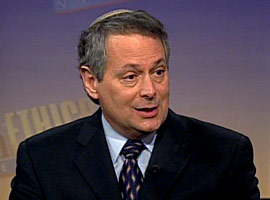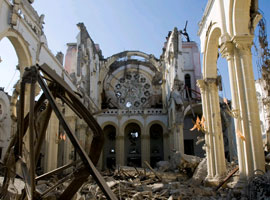In This Episode << SLIDE LEFT TO SEE ADDITIONAL SEGMENTS
Where was God in the Earthquake?
BOB ABERNETHY, anchor: Earthquakes and other calamities always provoke anguished questions about God’s role in disaster. How do religious leaders respond? Rabbi Jack Moline serves Congregation Agudas Achim in Alexandria, Virginia. Rabbi, welcome.
RABBI JACK MOLINE: Thank you, Bob.
ABERNETHY: When people come to you and say where was God in what happened in Haiti, what do you tell them?
MOLINE: The glib answer is to just say God was there. But I was walking through the synagogue the other day and a couple of kids were horsing around. One of them bumped her head and started to cry. Her friend immediately apologized, and I walked over and gave her a hug. I wasn’t able to stop the pain, but I was able to share it with her a little bit, as was her friend. I think that’s where God is—sharing that pain.
ABERNETHY: With the people who are suffering, suffering with them?
 MOLINE: With the people who are suffering. Absolutely.
MOLINE: With the people who are suffering. Absolutely.
ABERNETHY: What about causing it in some way in the first place?
MOLINE: Well, I think if we consider God to be the creator of nature, which I do, that this earthquake was going to happen. It was inevitable. So in that sense God caused it. But I entirely reject the notion that this was some sort of punishment for the bad behavior of the Haitian people.
ABERNETHY: Some people who survive say, why me? Why was I spared? I’ve lost my husband or wife or something, and yet here I am. What do you say to them?
MOLINE: Well, again, you know, on location you have to offer them comfort. But the question is the same as the question of did God cause this? The answer is I don’t see God micromanaging the world, plucking this one and abandoning that one. It simply is the nature of these things that we choose to be in the way of disaster sometime.
ABERNETHY: And is there a role for prayer in preventing this kind of thing?
 MOLINE: Prayer can’t prevent a natural disaster, but prayer can create a response in us that is appropriate. Psalm 147, for example, says that God is the healer of shattered hearts and the binder of wounds, knowing the number of stars in the sky and calling each one by name. When we recite that in prayer, and when we recite that prayerfully, it should inspire in us the same kind of reaction.
MOLINE: Prayer can’t prevent a natural disaster, but prayer can create a response in us that is appropriate. Psalm 147, for example, says that God is the healer of shattered hearts and the binder of wounds, knowing the number of stars in the sky and calling each one by name. When we recite that in prayer, and when we recite that prayerfully, it should inspire in us the same kind of reaction.
ABERNETHY: And are there lessons, theological lessons, religious lessons that come out of all this?
MOLINE: Probably, but the good news is, for all of us I think, they don’t have to be solved in our moment or even in our lifetime any more than they have been for the past history of the human community.
ABERNETHY: But there is something to be said about human responsibility—to make sure that buildings are constructed well and not shoddily?
MOLINE: I think the more we can do to prevent human suffering, the less we will be held responsible by whatever standard for human suffering that was preventable.
ABERNETHY: Rabbi Jack Moline, many thanks.
MOLINE: Thank you, Bob.

